|
|
|
Sort Order |
|
|
|
Items / Page
|
|
|
|
|
|
|
| Srl | Item |
| 1 |
ID:
135272


|
|
|
|
|
| Summary/Abstract |
Although some Middle Eastern countries, such as Saudi Arabia and Turkey, have tried to influence developments in Afghanistan from time to time, Iran—due to a long common history, geographic proximity, and cultural similarities—is by far Afghanistan's most important neighbor. In this article I seek to demonstrate that Iran, contrary to its image and often even more consistently than pro-Western countries such as Saudi Arabia and Turkey, has since 1979 acted in favor of an independent, centrally and moderately governed Afghanistan. Therefore, Iran will probably also be a stabilizing factor rather than a spoiler in every post–International Security Assistance Force (ISAF) scenario in Kabul.
|
|
|
|
|
|
|
|
|
|
|
|
|
|
|
|
| 2 |
ID:
135896


|
|
|
|
|
| Summary/Abstract |
In the US context, scholars have demonstrated that public support for military intervention is influenced by the elite debate as presented in the national news media and that the volume of elite criticism reported is largely determined by opposition in Congress. Because the media “index” the debate among officials in Washington, a lively and comprehensive airing of the pros and cons of a military intervention often depends upon Congressional leaders taking an oppositional stance. But sometimes, American reporters will incorporate a surge of foreign leaders' critical views, even when Congressional leaders support administration policy or when they choose to remain silent due to strategic considerations. The question addressed by this article is whether such departures from traditional indexing behavior—which bring foreign views into media coverage in a significant manner—can be predicted based on the circumstances and journalists' incentives. The article also explores whether high-visibility opposition by credible foreign leaders, in particular United Nations officials and European allies, can substitute for partisan cues from domestic leaders and invigorate a national debate in a manner that influences public opinion.
|
|
|
|
|
|
|
|
|
|
|
|
|
|
|
|
| 3 |
ID:
136033
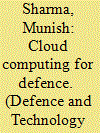

|
|
|
|
|
| Summary/Abstract |
Technology has always played the key role in defining the outcome of war. A modern-day military is investing in cutting-edge technologies to leverage their benefits in the evolving nature of warfare, which encompasses every aspect of science. In the case of information and communication technology (ICT), the research and development has unleashed vast potential for civilian and military applications, which vary from simple logic execution to high-end supercomputing. As cloud computing has made inroads in the operations of private sector, it is slated to perform a central role in the functioning of governments and defence and security agencies. Under the aegis of ICT, the emerging cloud computing can find applications in defence sector as it offers numerous advantages over traditional information technology (IT) systems such as scalability, agility and interoperability. The article is an attempt to identify the key defence operations where cloud computing could help in addressing the IT needs while keeping the acquisition and maintenance costs at minimal. It brings in the concerns and challenges lying ahead in the way of adopting cloud computing while taking stock of initiatives taken by the governments of leading militaries of the world.
|
|
|
|
|
|
|
|
|
|
|
|
|
|
|
|
| 4 |
ID:
134455
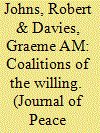

|
|
|
|
|
| Summary/Abstract |
Studies of public support for war highlight the importance of context. Most people do not simply support or oppose the use of force but instead assess its merits depending on various aspects of the situation. One such aspect is the extent of international backing – whether from individual states or supranational organizations – for military action. This backing may be active, notably through the contribution of troops, or more a passive matter of endorsement or authorization of action. In this article, a survey experiment embedded in a major internet survey of British foreign policy attitudes (N = 2,205) is used to explore how international backing affects public support for military action. Britain’s military potential and recent history make it an obvious case study here. Both active and endorsement backing prove to have separate and significant positive effects on support. Importantly, the absolute number of troops involved matters far less than the proportion of total troop numbers to be contributed. And the perceived strength of the enemy predicts support only when the British are to contribute a large proportion of total forces. Predispositional variables are used to investigate the sources of the experimental effects but with little success: the impact of international backing proves remarkably consistent across the sample.
|
|
|
|
|
|
|
|
|
|
|
|
|
|
|
|
| 5 |
ID:
136198


|
|
|
|
|
| Summary/Abstract |
Will Rogers once observed that “when you get into trouble 5,000 miles from home, you've got to have been looking for it.” It's a good deal more than 5,000 miles to Baghdad or Damascus from here. And, boy, have we gotten into trouble! We are trying to cope with the cumulative consequences of multiple failures. Just about every American project in the Middle East has now come a cropper. There is a new military campaign-morale patch commemorating this. It is available through Amazon.com for $7.45. The patch bears an escutcheon with a logo that, in the interest of decorum, I will not read out. It sounds like Operation Enduring Fluster Cluck.
|
|
|
|
|
|
|
|
|
|
|
|
|
|
|
|
| 6 |
ID:
135179


|
|
|
|
|
| Summary/Abstract |
The US strategy in Afghanistan has fallen short of neutralizing the insurgency that threatens the future stability. The primary insurgency's leadership council, the Quetta Shura, has effectively managed influence through a shadow government and superior tactics in recruiting marginalized tribal leaders, leading to a questionable outcome once Coalition forces withdraw in 2014. This article summarizes the threat posed by the Quetta Shura, coinciding with the deficiencies in the current US policy, and recommends a more viable strategy conducive to the current circumstances, based on historical and cultural precedence. Coalition forces have put a great amount of time, money, and effort into establishing a more stable Afghanistan. The USA needs a more aggressive strategy to counter the aspirations of the insurgency, thereby giving the Afghans the opportunity to further progress in the future. Under the current circumstances and policies, a peaceful transition after the Coalition withdrawal is becoming more unlikely.
|
|
|
|
|
|
|
|
|
|
|
|
|
|
|
|
| 7 |
ID:
136591
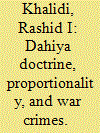

|
|
|
|
|
| Summary/Abstract |
IN JULY 2014, Israel launched its third and most massive military assault in a period of less than six years on the 1.8 million people of the Gaza Strip. In so doing, it killed over twenty-one hundred Palestinians and wounded more than eleven thousand. The vast majority of the thirteen thousand casualties were civilians, and well over half of them were women, children, old people, and the disabled. This latest massacre of the innocents provides the occasion for the Journal of Palestine Studies (JPS) to offer a special dossier centered on Gaza.
|
|
|
|
|
|
|
|
|
|
|
|
|
|
|
|
| 8 |
ID:
136583


|
|
|
|
|
| Summary/Abstract |
The goal of this study is to examine the effects of the joint education program that was newly constituted by the South Korean Army, Navy, and Air Force Academy in 2012 to improve the South Korean military’s joint operational capability. This paper investigates whether the joint education program bridged the cultural gaps that had existed historically among the armed services, resulting in a greater exchange of camaraderie and information. The findings demonstrate the positive impact of a joint education program on the exchange of camaraderie. In the later stage of joint education, military cadets are less likely to exchange camaraderie with those who came from the same military academy; but they are more likely to exchange camaraderie with those who share the same room in the military barracks, and with those who participate in formal training in the same classroom. In comparison to the exchange of camaraderie, however, the joint education program failed to produce a collaborative atmosphere in which three random service academy cadets actively exchanged information with one another. The South Korean case provides a model for building cohesion across different service members by using education, while also demonstrating its limitations.
|
|
|
|
|
|
|
|
|
|
|
|
|
|
|
|
| 9 |
ID:
136776


|
|
|
|
|
| Summary/Abstract |
The nature of warfare has undergone a major change over the last few decades, brought about by rapid advancement in technologies combined with changes in doctrines and organisational concepts. This has resulted in enhanced focus on integrated and joint operations. Unified structures have been put in place by all major militaries in the world to optimise their defence capabilities. India appears to be reluctant to adapt wholeheartedly to the changing nature of war-fighting despite facing a wide variety of threats to its internal and external security. This article makes a case for establishing unified commands in India to enhance integration and jointness at the strategic and operational levels. In doing so, it examines various available models for implementation in the Indian context. Finally, it suggests a viable model for unified commands for India keeping in mind the geo-political realm and the external and internal threats to its security.
|
|
|
|
|
|
|
|
|
|
|
|
|
|
|
|
| 10 |
ID:
137436
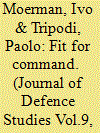

|
|
|
|
|
| Summary/Abstract |
Peace support operations (PSO)–counter-insurgency (COIN) operations are different and often significantly more complex than conventional operations. Such a complexity places greater demand on military leaders both at the tactical and operational levels. The diversity of tasks and threats, primacy of politics and the decentralized nature of PSO–COIN operations have serious implications for both junior and senior leaders. Although the fundamental leadership attributes for both conventional and PSO–COIN operations are timeless and common, in order to be successful in a PSO–COIN environment, military leaders should be more adept in certain attributes. This article, based on several case studies and a survey of military officers, shows that military leaders who possess and develop seven leadership attributes—adaptability, judgement, sociability, resoluteness, empathy, independence and knowledge/experience—are more likely to be successful at the tactical and operational levels in PSO– COIN.
|
|
|
|
|
|
|
|
|
|
|
|
|
|
|
|
| 11 |
ID:
135959


|
|
|
|
|
| Summary/Abstract |
Recent years have seen an increasing interest among international relations scholars in applications of pragmatist thought. Few works, however, have gone beyond discussing the epistemological and methodological implications of pragmatism. This article draws on a pragmatist understanding of human action to develop a novel explanation of norm change in contexts not amenable to more common analytical approaches. Specifically, concepts derived from pragmatism help explain how the creative recombination of practices by actors in response to changes in the material and social context of action can transform largely tacit notions of appropriate behavior. The article demonstrates the value of the approach by explaining the origin of a common contemporary security practice unknown prior to the Second World War and incompatible with the then-prevailing norms of sovereignty: the long-term, peacetime presence of one state's military on the territory of another equally sovereign state.
|
|
|
|
|
|
|
|
|
|
|
|
|
|
|
|
| 12 |
ID:
134456


|
|
|
|
|
| Summary/Abstract |
This analysis uses survey data representing three of the world’s most populous Muslim majority countries to challenge conventional wisdom on what shapes Muslim public opinion on political violence against the United States. It improves previous analysis by clearly distinguishing support for violence against civilians from support for violence against military targets and by featuring independent variables that clearly separate views on US foreign policies from views on US culture. Logistic regression shows that, among Egyptian, Pakistani and Indonesian Muslims, perceptions of controversial US policies toward Israel, Middle Eastern oil, or the perceived attempt to weaken and divide the Muslim world are not related to support for attacks on civilians in the United States, but only to support for attacks on US military targets. Approval of attacks on US civilians is shaped, instead, by negative views of US freedom of expression, culture, and people, disapproval of the domestic political status quo and the notion of general US hostility toward democracy in the Middle East. This last finding has important implications for US and Western policies toward the post-Arab Spring Middle East in particular and the broader relationship with the Muslim World in general.
|
|
|
|
|
|
|
|
|
|
|
|
|
|
|
|
| 13 |
ID:
137142
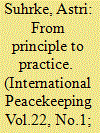

|
|
|
|
|
| Summary/Abstract |
During its engagement in Afghanistan, the US military seriously tried to mitigate the risk of civilian casualties from airstrikes only when called for by changes in military doctrine emphasizing the need to gain the support of the population. Consistent efforts by external political and humanitarian actors to reduce casualties by demanding more transparency and clearer lines of accountability for ‘collateral damage’ had little immediate, observable effect. The case study underlines the contingent nature of progress towards protecting civilians in armed conflict even when a military institution formally accepts the principles of customary international humanitarian law, but concludes that, faute de mieux, strategies to enhance protection through greater accountability and attention to the kind of military ordinance used remain central.
Over time there have been significant advances in international humanitarian law to strengthen the protection of civilians during armed conflict, and, as Adam Roberts notes, ‘in practice something has been achieved’.1 The record of the US military forces in Afghanistan after 2001, however, underlines the element of contingency in this development. During more than a decade of combat engagement in Afghanistan, the US military operated in a context of customary international law that was formally observed, but measures to reduce the impact of military operations on civilians varied significantly in practice. Only in two short periods did the USA or joint ISAF (International Security Assistance Force) command adopt practices to seriously mitigate the risk of civilian casualties. What explains this variation over time, and what does it tell us about the influence of legal norms on the belligerent?
Civilian casualties produced by US airstrikes produced the vast majority of casualties attributed to allied operations in Afghanistan. Authoritative sources reported almost 2,000 were killed and many more injured in the period 2006–13 (see Table 1).2 The US military and ISAF considered the civilian deaths as incidental damage – the unfortunate, accidental effects of war. Yet as Neta Crawford has argued, these effects were systemic in nature.3 They were ‘normal accidents’ in the sense originally developed by Charles Perrow: the predictable outcome of a flawed system design.4
|
|
|
|
|
|
|
|
|
|
|
|
|
|
|
|
| 14 |
ID:
135342


|
|
|
|
|
| Summary/Abstract |
We need to remember that we went into Afghanistan to eject Al Qaeda, not to improve women's rights. But the very success of our mission left us with responsibilities. Much has been achieved in health, in education, in creating a tax base and in governance-the recent elections were a conspicuous success, largely ignored by the media. But many problems remain, not least corruption. And there is the ongoing struggle with the Taliban Now, after more than ten years of engagement, NATO combat troops will withdraw at the end of 2014. This does not mean the Afghans will be abandoned. There will still be high levels of support for training and logistics. But what will happen? On the evidence so far, the Afghan Forces are likely to be able to prevent the Taliban taking over as long as the international community continues to pay the multi-billion dollar bill to sustain them. There are some grounds for thinking that a negotiated settlement with the Taliban is not impossible, partly because over the last decade, much has changed in Afghanistan. But It is still a poor country, not (yet) a liberal western democracy. One prophecy can be made with some certainty: if we do not continue to provide support, especially financial support, the result will be a rapid reversion to instability and conflict.
|
|
|
|
|
|
|
|
|
|
|
|
|
|
|
|
| 15 |
ID:
135190


|
|
|
|
|
| Summary/Abstract |
After 13 years of war, the loss of many thousands of lives, and the expenditure of trillions of dollars, what has the United States learned? The answer depends on not only who is asking but when. The story of the Iraq war would have different endings, and morals, if told in 2003, 2006, 2011, or 2014, and it will continue to evolve. As for Afghanistan, the narrative there has also shifted over time, and the ending also remains in doubt. Neither disaster has been unmitigated. But few would argue that Washington’s approach to either has been a success worth emulating. So the most important question today is what can be learned from the failures.
|
|
|
|
|
|
|
|
|
|
|
|
|
|
|
|
| 16 |
ID:
136408


|
|
|
|
|
| Summary/Abstract |
The article discusses the AFCEA Europe's 2014 TechNet Europe held in Paris, France from October 9-10 2014, co-organized by the European Defence Agency (EDA). Topics discussed include role of European Union (EU) military perspectives and role of military power in international relations in the framework of defence and security, the networking opportunities discussed by military and defence industry and several attendees of the event including Bruce Schneier, Markus J. Bentier and Rob de Wijk.
|
|
|
|
|
|
|
|
|
|
|
|
|
|
|
|
| 17 |
ID:
135581
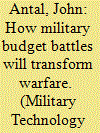

|
|
|
|
|
| Summary/Abstract |
In the 21st century a modernized military force and waging war is expensive. As wars engulf the Middle East, Africa and the Ukraine – to mentions a few hotspots- military budgets in the US and many other nations are slashed as their economies can no longer sustain previously high expensive levels. something but, what? How? has to change.
|
|
|
|
|
|
|
|
|
|
|
|
|
|
|
|
| 18 |
ID:
135595


|
|
|
|
|
| Summary/Abstract |
There will always be a trade-off between weight and protection in armour, but, but in the last year or so, developments in polymer fiber composites and in bio-inspired ceramic promise to make the compromise less painful for engineers tasked with creating solutions.
|
|
|
|
|
|
|
|
|
|
|
|
|
|
|
|
| 19 |
ID:
134653


|
|
|
|
|
| Summary/Abstract |
Western states—the U.S. and many European states—have since the early 1990s conducted military operations at a pace that overshadows the number of military operations during the threat-penetrated Cold War era. During the last twenty years, Western states have switched their military outlook from containment and deterrence toward active engagement and expeditionary warfare. It is argued that even though in many cases the objectives of military activism are good and noble, the unintended—and in many cases the unrecognized—consequences of such action will in the long run be negative at best—and potentially even dangerous.
|
|
|
|
|
|
|
|
|
|
|
|
|
|
|
|
| 20 |
ID:
134231


|
|
|
|
|
| Summary/Abstract |
A top diplomat from one of America's most dependable Middle Eastern allies said to me in July of this year, "but you no longer know how to act like one."
He was reflecting on America's position in the world almost halfway into President Barack Obama's second term. Fresh in his mind was the extraordinary string of errors (schizophrenic Egypt policy, bipolar Syria policy), missteps (zero Libya post-intervention strategy, alienation of allies in the Middle East and elsewhere), scandals (spying on Americans, spying on friends), halfway measures (pinprick sanctions against Russia, lecture series to Central Americans on the border crisis), unfulfilled promises (Cairo speech, pivot to Asia), and outright policy failures (the double-down then get-out approach in Afghanistan, the shortsighted Iraq exit strategy).
|
|
|
|
|
|
|
|
|
|
|
|
|
|
|
|
|
|
|
|
|